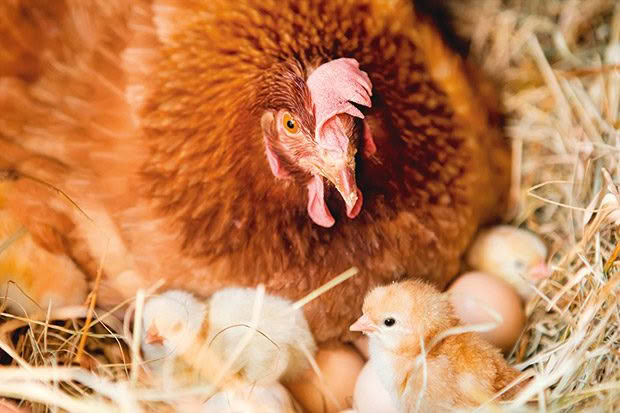8 causes of abnormal chicks (plus nutritional deficiency symptoms to know)

Keep an eye on these common factors for your best chance at a successful hatch.
Words: Sue Clarke
1. High humidity during incubation: hatched chicks with unhealed navels or dead chicks, chicks drowned during pipping, splayed legs.
2. Low humidity during incubation: red hocks, sticky down, small chicks.
3. High temperature: exposed brain, cross beak, missing eyes, sticky chicks, black buttons on the navel.
4. Low temperature: stringy navel.
5. Improper turning, eg stopped too early or not frequent enough: exposed brain, missing eye(s), ‘star gazing’ (head tipped back, looking at the sky), duplicated/extra legs.
6. Deficient parental diet, especially vitamins: short down, wry neck, exposed brain, swollen neck.
7. Dirty eggs: yolk sac infection, rotten, dead chicks, mouldy, black embryos.
8. Genetics: inherited conditions, inbreeding.
NUTRITIONAL DEFICIENCY DISEASES
Poor nutrition in parent birds can seriously affect the viability of a chick.
Vitamin A
Symptom: Nutritional roup (respiratory issues); polyneuritis (muscle and nerve paralysis); opaque cornea, staggering gait.
Vitamin D
Symptom: Rickets (rubbery, brittle bones); stunted growth. Signs in parents: soft-shelled eggs; decreased egg production; decreased hatching percentage.
Vitamin E
Symptom: ‘Crazy chick’ disease (encephalomalacia)Signs in parents: loss of fertility in males; decreased hatching percentage.
Thiamine (B1)
Symptom: Polyneuritis (retraction of head, retarded growth, ‘star gazing’ – head tipped back, looking up at the sky)
Riboflavin (B2)
Symptom: Curled toe paralysis Signs in parents: decreased egg production; poor hatching rate
Pyridoxine (B6)
Symptom: Stunted growth; convulsions.
Choline
Symptom: Slipped tendon (perosis); swollen hock joints.
Biotin
Symptom: Dermatitis lesions of feet and beak
MINERAL DEFICIENCY DISEASES
Calcium
Symptom: Thin-shelled or shell-less eggs; decreased egg production; poor hatching rate. In chicks: retarded growth.
Phosphorus
Symptom: Decreased egg production. In chicks: soft bones.
Manganese
Symptom: Thin-shelled/shell-less eggs; decreased hatching percentage. In chicks: slipped tendons; dwarfing of long bones; abnormal embryo.
Magnesium
Symptom: In chicks: loss of appetite; convulsions.
Zinc
Symptom: In chicks: enlarged hock joints; retarded growth; poor feathering; shortening and thickening of leg bones.
Copper, iron
Symptom: Anaemia; aorta rupture; feather depigmentation. In chicks: retarded growth.
Selenium
Symptom: In chicks: muscular dystrophy; loosening of and haemorrhages in muscles.
MORE HERE:
Love this story? Subscribe now!
 This article first appeared in NZ Lifestyle Block Magazine.
This article first appeared in NZ Lifestyle Block Magazine.
